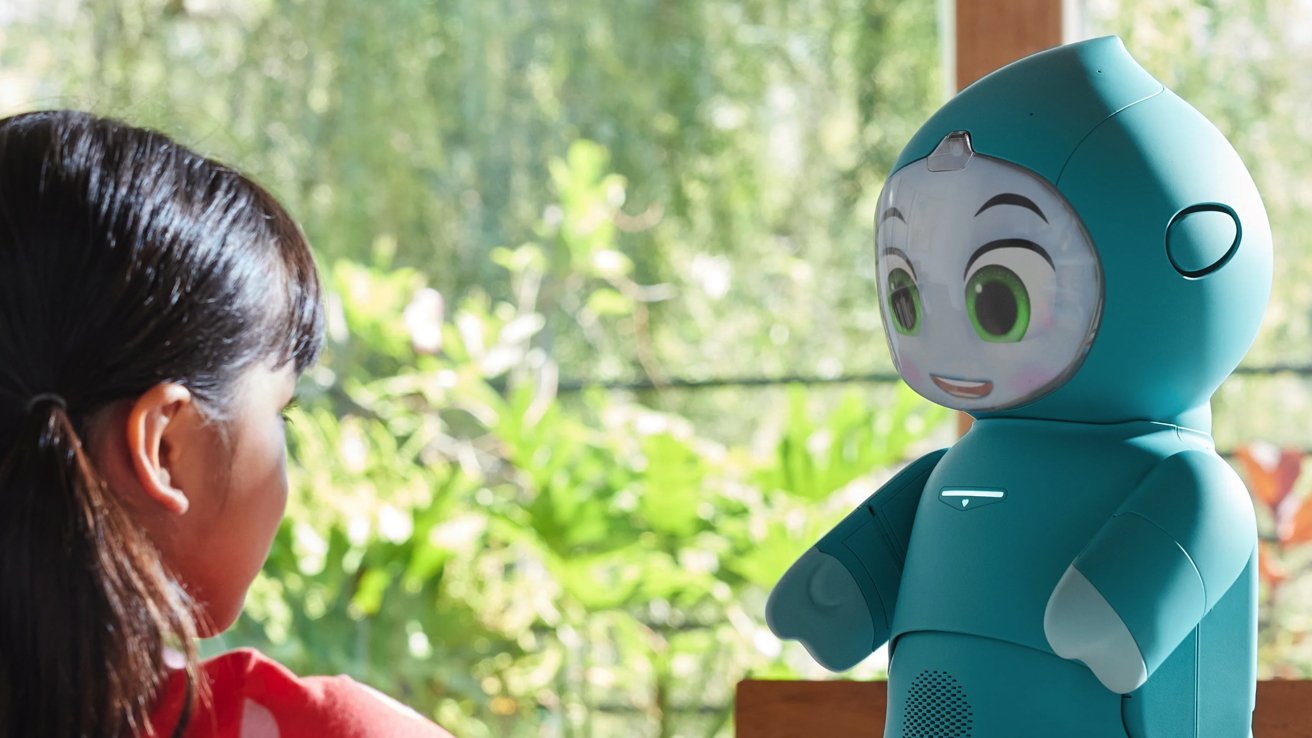The Moxie robot that used cloud processing for a large language model was designed to be a companion and education tool for autistic children, and it's being unceremoniously shut down by the owners. This absolutely insensitive and destructive move practically demonstrates that Apple's on-device approach is right.
Launched in 2020, Moxie was billed as an AI-based robotic companion for children. It offered hope to parents of autistic children with the possibility of helping social development. It showed great promise to help autistic kids in particular.
I considered one for my children, but when I found it, we were in the teeth of early COVID and I had other concerns. I'm glad I didn't get one, because a series of bad decisions by the operating company means that the robot is dying in the next few days.
For $799, the company delivered a robot with a large face that maintained eye contact with children, had seven points of articulation, and was made from a soft-touch material for hugging. For autistic users, the robot enabled play-based learning, communication skills, including emotional regulation which can be hard to teach an autistic child like my son.
However, parents and children who use Moxie will soon have to deal with the robot dying completely. Dead. Not even a standby mode with limited functionality.
Embodied, Inc., the company behind the AI robot Moxie, is shutting down and this dad had to break the news to his daughter.
— Zero State Reflex (@ZeroStateReflex) December 3, 2024
To a kid this feels like a death of a family member.
We're going to have to deal with AI friends disappearing soon. pic.twitter.com/AUiBKJviaM
The reason, as you'd expect, is the cost of the cloud-based LLM that the company uses to run the robot.
The death of Moxie
In a "Closing FAQ" distributed to users and shown on the product's website, it is explained that the parent company, Embodied, is shutting down.
Founded in 2016 by former iRobot CTO Paolo Pirjanian and USC robotics professor Maja Mataric, the social robotics startup aimed to use AI and robotics to improve care. It had considerable backing at first, with Intel Capital, Amazon Alexa Fund, Sony, Toyota, and others helping the outfit.
However, the FAQ says Embodied was enduring "financial challenges," with a critical funding round falling through and making it unsustainable to continue. An unnamed lead investor for the round had been secured, but they pulled out at the last minute.
"Despite our best efforts to secure alternative funding, we were unable to find a replacement in time to sustain operations," the post states.
For customers, there's little that they can do about the situation. Moxie relies on cloud services to function, and when they shut down, the robot will too.
Embodied itself doesn't know when that time will be, but "it is likely to happen within days." Even so, the company is still looking into ways to keep it operating for as long as possible.
The FAQ explicitly states that Moxie cannot run with local processing, and it cannot be used offline at all.
Refunds, warranties, and repair services will also end as the company dissolves. And, if you're on a payment plan, tough luck, you're still on the hook.
There is the small "uncertain" hope for another company to pick up Moxie and continue running the cloud services. If that does happen, Embodied customers will be told about the change of ownership and the reactivation of services.
As for how parents could break the news to children who won't be able to use Moxie anymore, the company provided a letter from the Global Robotics Lab to "help guide this conversation in an age-appropriate way."
The way the robot was made and how services were set up, meant a catastrophic business failure immediately trickled down to consumers. And, those consumers were mostly ill-equipped to deal with the shutdown.
For parents, it's the loss of a lifeline and a training tool. For the children, it's the death of a friend.
As a parent of autistic children, I'm infuriated by how this is being handled. And it could have been avoided.
Local processing
I had some incredibly vile things to say about this company, the founders, and how they're handling this. Maybe someday, I'll publish the first draft where I laid into the company and founders in the way that only an ex-Navy sailor can.
Yes, I'm that angry about it. I have rage for the parents and children impacted by it. Had I bought one like I said I was considering earlier in this piece, I'd be having an incredibly hard discussion with two children this morning about it, and there'd probably be fallout.
Anyway. If Moxie were designed differently, to allow for local processing like Apple does or even the offloading of it to a local device capable of that, the shutdown of Embodied wouldn't have made a massive impact on consumers who least deserve to get reamed by capitalism. Without the need to connect to cloud servers for queries, it would presumably maintain core functionality, but more processing-intensive features would be affected.
As to why this wasn't done with Moxie, the reasoning is simple and unforgivable. Doing local AI processing is really hard and expensive to do — and this is something they should have thought about before.
For a start, you need some serious hardware to run LLMs locally, because it's extremely processor intensive. You also need to store a lot of local data, the Large Language Models (LLMs) and other information required for the AI to function, which could be considerable in some cases.
Storing that data, collecting more over time, and processing it, takes a lot of resources to pull off. Certainly too much of the $799 sale price of the Moxie to properly pull off.
The obvious counterpoint to this is to say that Apple did it with the iPhone, and in the $599 Mac mini and so Embodied could've done it too. This is true, as Apple does do local processing for many queries, though it does still use cloud servers for some elements.
That's even before you consider the integration of ChatGPT in Siri as part of Apple Intelligence.
This is a level of funding that Embodied simply didn't have at its disposal. And, given what they were making, why they were making it, and who it was tailored for they should be absolutely ashamed — and shamed — for not having a better shutdown plan with some kind of hand-off, letting it get this far, and leaving children with a dead hunk of plastic where their friend used to be.
 Mike Wuerthele
Mike Wuerthele







-m.jpg)






 Christine McKee
Christine McKee
 Chip Loder
Chip Loder
 Malcolm Owen
Malcolm Owen
 Marko Zivkovic
Marko Zivkovic
 Wesley Hilliard
Wesley Hilliard







-m.jpg)




18 Comments
Come on, Mike. The company tried their hardest to make a great product for autistic kids. That's far more than most companies put into this area of care. They went bankrupt because some funders pulled out. But sure, lay into the company (whose employees no longer have a job right before Christmas, BTW) over a product that YOU NEVER BOUGHT. Maybe if people like you had actually bought it, they'd have had more runway due to more encouraging success metrics? Good grief. The problem with the internet in 2024 is everyone wants to be a virtual shame+rage machine for clicks. This "article" fits that bill.
I agree with you completely. In a larger picture though it’s why I try to avoid products that require cloud connection to function. Even my iPhone can do something if the network is down, but how many times have we read this kind of a story. This company decides to stop supporting a product and customers are left with an expensive, and dead, doorstop, {cough}Spotify{cough}? How many people have bought everything from light switches, to toys, to safety equipment only to find that a decision made by a bean counter across the world means they are SOL? This is why I don’t trust systems that require a cloud connection and process the data out there somewhere.
So yeah they should have had everything processed in the robot but the money wouldn’t allow it. We have to stop blaming the money and put it on the people that make these decisions. Not the founders of the company, they tried their best. I mean the money people who saw only profit or loss and not the good something like this could do.
Moxie can be jailbreak and O-llama can be run on a PC if we could get the word out all may not be lost for Moxie. If we can get a community together it could be configured to run a locally sourced LLM... I work in IT and have a background in robotics also.
I appreciate this story very much. It's about AI but also about the obsolescence that thrives under capitalism. We need to think about how this impact people. Thanks for sharing a firsthand account.